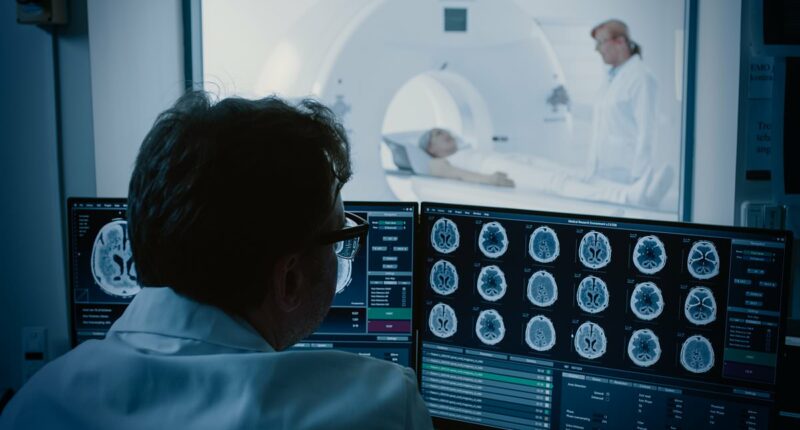Share this @internewscast.com
Researchers have uncovered the secret behind why some individuals in their 80s maintain exceptionally sharp memories, performing on par with people three decades their junior.
This unique group, known as SuperAgers, seems to defy the typical signs of cognitive aging due to their brains retaining a youthful biological state.
American scientists discovered that these individuals have significantly lower levels of amyloid and tau, two toxic proteins associated with memory issues, which are less prevalent in their brains.
Amyloid and tau have a tendency to form plaques and tangles that disrupt brain cell function, believed to be a driving force behind Alzheimer’s disease, the most prevalent type of dementia.
The study also revealed that SuperAgers do not exhibit the usual thinning of the cortex, the brain’s outer layer crucial for decision-making and memory retention.
Experts have hailed these groundbreaking findings as potentially transformative, suggesting they could lead to innovative strategies to prevent or delay cognitive decline in older adults.
Professor Sandra Weintraub, a neuropsychologist at Northwestern University in Illinois, said: ‘Our findings show that exceptional memory in old age is not only possible but is linked to a distinct neurobiological profile.
‘This opens the door to new interventions aimed at preserving brain health well into the later decades of life.’

Scientists have discovered why a lucky few people in their 80s retain razor-sharp memories – performing as well as those three decades younger
The term SuperAger was coined in the late 1990s by Dr M. Marsel Mesulam, founder of the Mesulam Center for Cognitive Neurology and Alzheimer’s Disease at Northwestern University in the US.
To qualify as a SuperAger, participants must be aged 80 or over and score as well as someone in their 50s or 60s on a standard memory recall test, remembering at least nine out of 15 words after a delay.
They must also perform normally for their age on other cognitive measures such as language, attention and executive function, and have no history of neurological or psychiatric illness that could affect performance.
Those accepted into the programme are reassessed annually with brain scans and cognitive testing – and many later choose to donate their brains for research.
Since 2000, some 290 SuperAgers have taken part in the programme, with researchers examining 77 of their donated brains after death.
Some of these brains contained the toxic amyloid and tau proteins – also known as plaques and tangles – that are hallmarks of Alzheimer’s disease, while others showed no build-up at all.
Professor Sandra Weintraub said: ‘What we realised is there are two mechanisms that lead someone to become a SuperAger.
‘One is resistance – they don’t make the plaques and tangles. Two is resilience – they make them, but they don’t do anything to their brains.’
The findings were recently published in Alzheimer’s & Dementia: The Journal of the Alzheimer’s Association.
Researchers also found that unlike typically ageing adults, the brains of SuperAgers show no significant thinning of the cortex, the outer layer of the brain responsible for higher functions such as memory, motivation and decision-making.
In fact, many had a thicker anterior cingulate cortex than younger people.
Their brains also contained more von Economo neurons, specialised cells linked to social behaviour, and larger entorhinal neurons – crucial for memory – than those of their age-matched peers.
Despite differing lifestyles and exercise habits, the study found that SuperAgers tend to be highly social and report strong interpersonal relationships, suggesting that staying connected may help protect against cognitive decline.
At Northwestern’s Mesulam Center, participants are assessed annually and may choose to donate their brains for post-mortem research.
Dr Tamar Gefen, associate professor of psychiatry and behavioural sciences at Feinberg and director of the university’s Laboratory for Translational Neuropsychology, said: ‘Many of the findings from this paper stem from the examination of brain specimens of generous, dedicated SuperAgers who were followed for decades.
‘I am constantly amazed by how brain donation can enable discovery long after death, offering a kind of scientific immortality.’

University College London scientists estimate 1.7 million Britons will be living with dementia by the year 2040
Early signs of Alzheimer’s are forgetfulness, losing belongings, struggling to think of the right word, asking questions repetitively and hesitance to try new things.
However, recent studies have shown that loss of smell, sight, hearing, taste, touch and balance are also signs of the illness.
Risk factors for the devastating illness include age, family history, head injuries, heart disease, smoking, obesity, diabetes, high blood pressure and high cholesterol.
Recent analysis by the Alzheimer’s Society estimated the overall annual cost of dementia to the UK is £42billion a year, with families bearing the brunt.
An ageing population means these costs—which include the lost earnings of unpaid carers—are set to soar to £90billion in the next 15 years.












